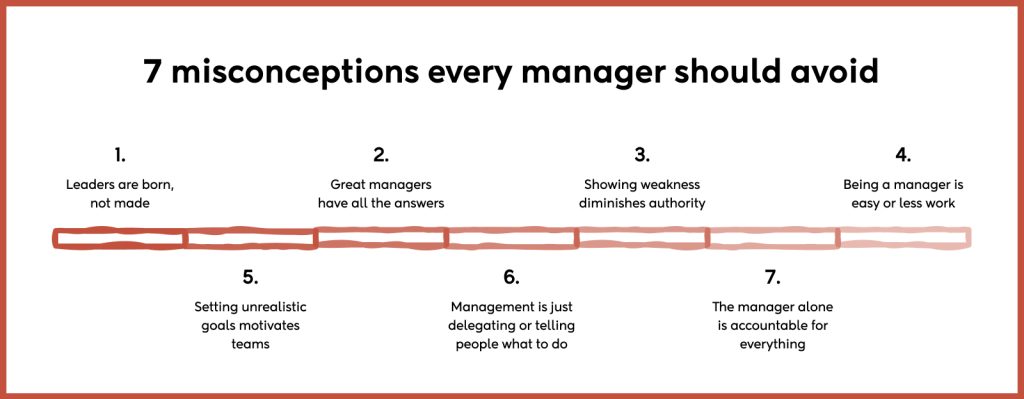Teamwork has become one of those concepts everyone claims to value but few truly understand. Walk into any organzation and you will easily find leaders who pride themselves on building collaborative cultures. They’ve read the books, attended the seminars and implemented all the ‘best practices’. Yet their teams still struggle with misalignment, missed deadlines and productivity gaps.
Here, the real culprit isn’t a lack of effort; it’s a foundation built on misconceptions. These misconceptions don’t just cost time and money, they actively damage a team’s performance, erode trust and burn out your best team members. And the more worrisome part is that these myths are so widely accepted that they are rarely questioned.
In this post, let’s examine seven persuasive misconceptions that even experienced managers fall for and, more importantly, what you should do instead.
7 misconceptions every manager should avoid

To lead effectively, you should know the thin line between what is truth and what is a misconception. To ease your thoughts, here are seven misconceptions that every manager should avoid.
Misconception #1 : Leaders are born, not made
The myth that leaders are born with a natural ability is comforting because it explains why leadership feels hard—you either have it or you don’t. But this couldn’t be further from the truth. While some people have traits like confidence or charisma that make early leadership experiences easier, these qualities alone don’t create effective leaders. In fact, many “natural” leaders plateau precisely because they rely on innate charm instead of developing real skills.
The best leaders are built through deliberate practice, uncomfortable feedback, and continuous learning. Communication, decision-making, emotional intelligence, and adaptability aren’t genetic—they’re learnable. Many of today’s most respected leaders started as awkward, uncertain managers who simply committed to getting better.
What to do instead: Treat leadership like any other professional skill. Seek feedback regularly, study how great leaders operate, reflect on your decisions, and practice new approaches. Invest in leadership training not as a nice-to-have, but as essential professional development.
Misconception #2: Great managers have all the answers
When you believe you need to have every answer, you create a repo where your team stops thinking critically and starts waiting for you to solve everything. This isn’t leadership—it’s bottlenecking. You become the single point of failure, and your team becomes passive and dependent.
The leaders who build the strongest teams are those who admit what they don’t know, leverage collective intelligence, and create space for others to contribute their expertise.
What to do instead: Lead with curiosity. When someone brings you a problem, resist the urge to immediately provide the solution. Instead, ask: “What do you think we should do?” “What have you already tried?” “What would success look like?” This shifts your role from answer-provider to thinking partner—and builds a team that can solve problems without you.
Misconception #3: Showing weakness diminishes authority
Many managers believe they must maintain an image of flawless competence to earn respect. They hide struggles, mask uncertainty, and never admit mistakes. On the contrary, instead of inspiring confidence, this facade creates distance and breeds a culture where everyone else hides their struggles, too.
When you pretend to be perfect, your team learns that authenticity isn’t safe. They start concealing mistakes, avoiding risks, and managing your perception of them rather than focusing on actual work.
The most respected leaders aren’t the ones who never stumble—they’re the ones who own their missteps, learn publicly, and create an environment where it’s safe to be human.
What to do instead: Distinguish between being vulnerable and being incapable. Share what you’re learning and where you’re growing. When you make a mistake, acknowledge it directly: “I got that wrong, here’s what I’m doing differently.” Model the honesty and self-awareness you want to see in your team.
Misconception #4: Being a manager is easy or less work
There’s a pervasive belief that moving into management means less “real work” and more comfortable oversight. The truth? Management is one of the most demanding transitions you’ll make. As an individual contributor, you controlled your own output. As a manager, you’re responsible for multiplying results through others—which means navigating personalities, competing priorities, and constant ambiguity.
You’re no longer judged by what you personally produce, but by how well your team performs. That means your success now depends on variables you can influence but not control. You’re coordinating multiple moving parts, making decisions with incomplete information, and being accountable for outcomes you didn’t directly create.
What to do instead: Recognize that the skills that made you successful as an individual contributor won’t automatically translate to management. Invest time in developing new capabilities: coaching, conflict resolution, strategic thinking, and emotional regulation. Be patient with yourself during this transition—management is a new career, not a promotion within your old one.
Misconception #5: Setting unrealistic goals motivates teams
Some managers believe that setting the bar impossibly high will push people to achieve more than they thought possible. The logic seems sound: aim for the moon and you’ll land among the stars. But in practice, goals that feel unattainable don’t motivate—they trigger disengagement and learned helplessness.
When people consistently fall short despite genuine effort, they stop trying. Why invest energy in something that feels rigged for failure? Research consistently shows that motivation comes not from impossible standards but from a sense of progress, achievable milestones, and the belief that effort will pay off.
What to do instead: Set challenging but realistic goals using the SMART framework (Specific, Measurable, Achievable, Relevant, Time-bound). The sweet spot is “difficult but doable”—goals that require stretch but feel within reach. Break big objectives into smaller wins so people can see progress. And when circumstances change, adjust goals rather than demanding people achieve the impossible.
Misconception #6: Management is just delegating or telling people what to do
If you think management means dividing up tasks and checking that they get done, you’re confusing management with coordination. Real management is about alignment, context, empowerment, and continuous leadership and team development that strengthens collaboration over time. It’s helping people understand not just what to do, but why it matters and how their work connects to the bigger picture.
When you reduce management to task assignment, you create a team of order-takers, not problem-solvers. People do exactly what they’re told and nothing more, because they don’t understand the purpose behind the work or feel ownership over the outcomes.
What to do instead: Before delegating, provide context. Explain the goal, the constraints, and why this work matters. Then give people autonomy over how they achieve it. Check in on progress without micromanaging. Your job isn’t to tell people every step to take—it’s to equip them to figure out the right steps themselves.
Misconception# 7: The manager alone is accountable for everything
Great leaders take full responsibility for everything their team does. While this sounds noble, it actually creates dysfunction. When you position yourself as the sole person accountable, your team learns that success and failure aren’t really their problem—they’re yours.
This increases dependency. People wait for your decisions, look to you for every answer, and avoid taking initiative because they know you’ll handle it. The team becomes an extension of you rather than a group of empowered individuals working toward a shared goal.
What to do instead: Distribute accountability throughout the team. Make it clear that everyone owns a piece of the outcome. Define who’s responsible for what, and hold people accountable for their areas. Support them when they struggle, but don’t rescue them from every challenge. Yes, you’re ultimately responsible as the leader—but true leadership means building a team that doesn’t need you to micromanage every detail.
Conclusion
Start small. If you’re the “manager with all the answers,” commit to asking three questions before offering any solution this week. If you’ve been hiding your struggles, share one thing you’re working to improve in your next team meeting. If you’ve been the hero carrying everything, identify one responsibility you can transfer to someone else.
Leadership isn’t transformed overnight. It’s built through hundreds of small choices to do the harder, more honest thing. The managers who grow aren’t the ones who never had these misconceptions—they’re the ones who noticed them and chose differently.






















No Comments